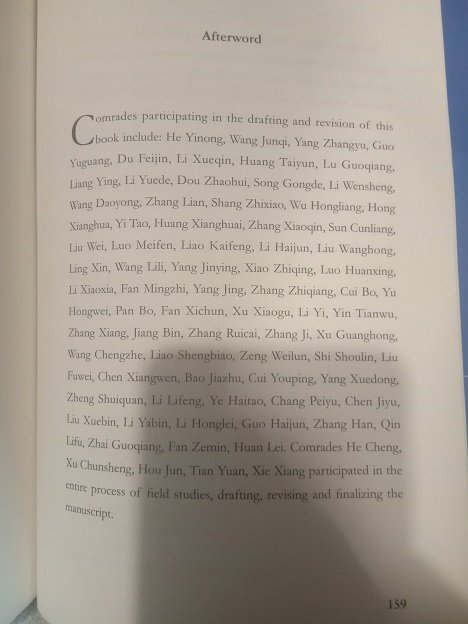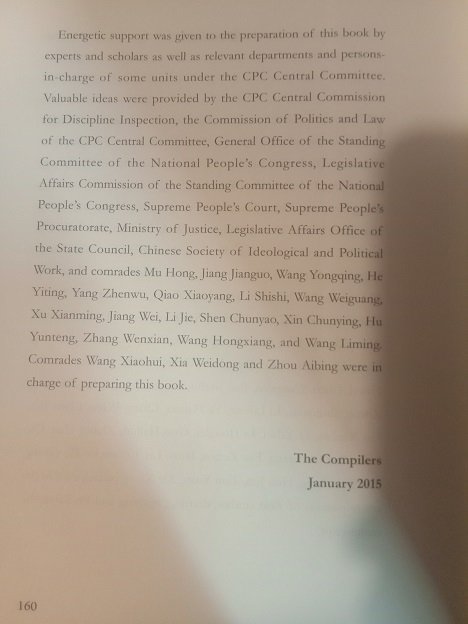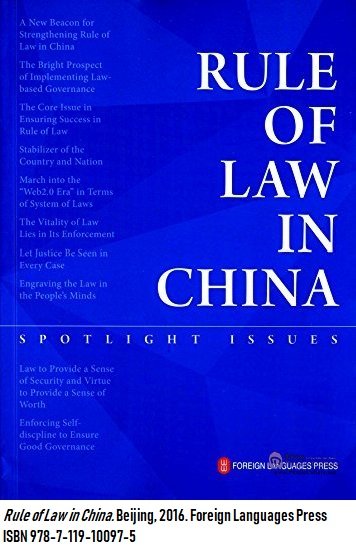Book Review: "Rule of Law in China," by Various Uncredited Authors
Is This a Satire?
From the first time I laid eyes on this book in Beijing Foreign Languages Bookstore (gotta love the originality the Chinese put into names), a single glance at the title was enough to induce a hearty belly-laugh. After all, not only have I written very, very, very extensively on the fact that "law" in China is an extremely fuzzy term, but so has virtually every China-watcher to ever write about their time here (Chu, 179; McMahon, 14 - 18; Fenby, 107; Midler, 27, 74, 152-154, 157,).
In light of this, the back cover's assertion that the book "covers 10 hot topics related to the current development of rule of law in China that inspire attention both at home and abroad" read like something out of an episode of "Sliders."
...Imagine a universe where China had a functioning legal system...
The author is not listed anywhere on the cover (nor is the translator, which tells me there was no original Chinese edition, which means it was intended solely for foreign consumption, which makes my propaganda sensors go into red alert), so I knew I wasn't going to be reading anything too juicy.


But the price was only 68 RMB (about $9.75 in US dollars at today's exchange rate, maybe a little higher back in the summer) and the print size and thin stature made it plain this would be the reading of a few afternoons at most. Besides, I had a 16 hour flight to Dallas coming up and needed something to read on the plane that wouldn't require much thought. All things considered, I threw it in my basket thinking it'd be good for a laugh or two.
And man, was it ever!
Problem #1: It Says Very Little
The book specializes in admonitions which, it says, MUST be followed.
First, it is necessary to unswervingly uphold the leadership of the CPC... (page 34)
It is essential to uphold the leadership of the CPC to exercise Socialist Rule of Law (page 35)
It is necessary that the NPC fully plays a leading role in such activities as legislative planning, legislative project approval, law drafting, deliberation, amendment making and voting. (page 58)
The NPC needs to build a workforce of high-caliber legislative professionals... (page 58)
It is therefore necessary to improve the legislative procedures of governmental departments. (page 59)
On and on it goes. In one particular place (pages 63 & 64) the book even points out six things it is "necessary to improve" within the span of two paragraphs.
And yet there is not one, single, solitary word ANYWHERE in the book about how these "necessary" improvements can be made, other than to repeatedly insist that they must be made.
Now, I could overlook that if this book was written as a review of China's judicial system, but it is not. It openly brands itself as a guide to the specific measures China claims it is taking to improve the aforementioned system.
[This book] explicitly answers the fundamental question of where and how law-based governance in China will develop. (page 10, emphasis mine).
There is nothing "explicitly answered" anywhere in the book. It is as if the contributors (whose names fill up a page but not one of whose names is on the cover or insert) are afraid to dare make a suggestion, lest they be ridiculed for "Western Thinking." All they say is "to improve, we must improve, so we will improve. How? By improving."
Problem #2: What Little it Says is Hollow and Sycophantic
Of the few times the book does attempt to make a point other than the Chinese legal profession's equivalent of Animal Farm's Boxer ("we will improve... we will improve..."), that point is never anything other than "hail the mighty China" or "long live the Communist Party." The book begins with ten pages of dogmatic assuredness of the "inevitability" of China's "great rejuvenation (or, as their Chairman likes to phrase it, Zhonghua Minzu Weida Fuxing (Shapiro))."
China is sure to march forward towards its "second centenary goals" after attaining its "first centenary ones." (page 4)
...China is sure to be transformed from "beautiful renderings" into a reality, and the building will tower in grandeur. (page 8)
From here, the flag-waving gives way to kowtowing at the feet of the CPC, with never-ceasing reminders of how the CPC "saved" China and warnings of the imminent collapse of China if the people ever dare to fail to continue devotedly following them (emphasis added for sarcasm, in case it wasn't obvious).
The Party's Leadership is the most essential feature of socialism with Chinese characteristics and the most fundamental guarantee for socialist rule of law in China. (page 12)
...the exercise of the Party's leadership must be expressed throughout the whole process and in every aspect of law-based governance in the country. (page 13)
It was not until the founding of the People's Republic of China and the creation of the socialist system that the fundamental political prerequisites and institutional basis for practicing the rule of law in a real sense were established. (page 23)
And it gets more desperate.
Only through law-based governance and earnest practice of rule of law under the leadership of the CPC can the people fully perform their role as masters of the country. (page 26, emphasis mine)
And of course one of the most cloyingly mawkish...
Who can shoulder the important task of leading the efforts to develop the rule of law in China? The CPC is no doubt the only choice. (page 26)
Am I beating a dead horse by asking (rhetorically, of course) if there is any supporting information given to explain WHY the supposed "necessity" of the Party's leadership over every aspect of this should be so supposedly "obvious?" Take a wild guess if any is given. I suspect that if pressed for an answer, the contributors would offer "because I will find myself on the wrong end of one of Xi's anti-corruption investigations if I don't shout 'Amen' loud enough whenever the Party preaches."
Problem #3: The Hollow Sycophancy isn't Even New
I could almost forgive this 2016 book for prattling on without saying anything, if it weren't for the fact that between its more than fifty contributors, not one could even prattle out anything new! More than half the book is merely Confucian-style rote repetition of Xi Jinping's speeches at the 18th CPC Central Committee in 2014, collected later in 2017's Governance of China, Vol. II so Xi could collect royalties from their mandatory purchase by Party members and applicants. Let's compare a few examples.
It is necessary to standardize the operation procedures of law enforcement. (page 82)
We need to focus our efforts on resolving serious problems, such as failure to enforce the law in a standardized, transparent, and civil manner. (Xi, p.130)
And again...
It is necessary to strictly implement certification and credentials systems for those working in administrative law enforcement... (page 84)
At the same time, we need to impose strict requirements on credentials in law enforcement...(Xi, page 130)
And for a third example...
...the Constitution of the PRC explicitly states that the people's courts exercise judicial power independently, in accordance with the provisions of the law, and are not subject to interference by any administrative organ, public organization or individual. (page 95)
They [judicial officers] must have the courage to lawfully reject interference from both inside and outside the judicial system, and stand their ground in defense of judicial impartiality. (Xi, page 131)
This one is perhaps my favorite, because the statement made by Xi and echoed by the compilers (who claim it comes directly from the PRC Constitution) stands in direct contradiction to an earlier statement made by professor Yan Jirong at Renmin University in his book China's Governance (no relation to Xi's Governance of China), defending China's judicial system by claiming it was superior, specifically because it did NOT have an independent judiciary!
The so-called "judiciary independence" means that the court can make any judgment it wishes within the scope stipulated by the law in trial of cases regardless of any consequence caused by the judgment... Chinese judges have to consider the law and the social effect of judgment in the trial of cases. (Yan, p. 78)
It is worthy of note that both China's Governance and Rule of Law in China were written by Party members, at the Party's order, for the Party's goals, during the administration of the same Party leader.
OOPS!
I Don't Think "Rule of Law" Means What You Think it Means
Perhaps the greatest problem with the entire book is that it never gives a clear definition of what its writers mean by "Rule of Law." However, it does offer hints, and those hints are worrisome. Admittedly, even most Western countries have never codified their own definition of this concept, per se, but there has been a consensus that is more-or-less encapsulated by Lord Tom Bingham in his rather unoriginally entitled work, Rule of Law.
We mean, in the first place, that no man is punishable or can lawfully be made to suffer in body or goods except for a distinct breach of law established in the ordinary legal manner before the ordinary courts of the land... We mean in the second place when we speak of 'the rule of law' as a characteristic of our country, not only that with us no man is above the law, but (which is a different thing) that here, every man, whatever be his rank or condition, is subject to the ordinary law of the realm and amenable to the jurisdiction of the ordinary tribunals. (Bingham, pages 4 & 5)
If Bingham's work is to be taken as the definition of the titular concept, Rule of Law, then it seems the key words in the title of Rule of Law in China are "in China," because it hints at a VERY different definition.
This historical commitment [to establish rule of law] was accomplished as scheduled by the end of 2010, bringing forth a situation that there is law to go by in every aspect of national life. (page 54, emphasis mine)
Earlier on, the book defines "Rule of Law" more simply, as simply "ensuring that the whole society abides by the law (page 30)." Essentially, China uses the phrase "Rule of Law" as a way to make "tightening the Party's grip on power" more appetizing to Western ears. Fenby commented on the fact that China's much-lauded "judicial reforms" are actually little more than precisely this.
A drive was undertaken to streamline the legal system, not with the aim of introducing the independent rule of law but to make the courts more efficient in imposing Beijing's will in line with legalist practice. (Fenby, 40)
As to why the Chinese regime is so insistent on using a Western-friendly term for this, Midler offers an explanation with his examination of China's habit of painting America's best-loved catch-phrases over their international propaganda in order to make it more marketable (Midler, 63 - 65), but for lack of a segment short enough to quote and poignant enough to stand alone, I'll leave the citation to suffice for now, and return to the book being reviewed.
So, Is There Any Reason to Read It?
For most people, no. For those seeking insight into China's legal practice, I would recommend Yan's China's Governance.
The only reason to read Rule of Law in China is if one seeks to understand the copy-and-paste, echo chamber process by which political literature is written in China (AWK! Echo the Chairman... echo the Chairman! AWK!), then reading the "Rule of Law" section of Xi's Governance of China, Vol. II and then reading this immediately after, with pens and highlighters in hand to make notes of all the repetition, could prove a useful case study, not so much for what it says as for the lengths it goes to to make sure NOT to say anything that the Chairman didn't already say.
Alternatively, if one is looking for a book that shows how desperate the CPC is getting in their quest to hold the loyalty of the People, then the number of times times this book vociferously calls upon the Chinese flock not to stray from their Communist Faith (the phrasing even sounds like a Southern Baptist preacher in many cases) makes it useful for this purpose I suppose.
For anyone else, don't bother.

Works Cited
Bingham, Tom. The Rule of Law. London, 2010. Penguin Books
ISBN 978-0-141-03453-9
Chu, Ben. Chinese Whispers. London, 2013. Weidenfeld & Nicolson.
ISBN 978-1-7802-2474-9
Fenby, Jonathan. Will China Dominate the 21st Century? Cambridge, 2017. Polity.
ISBN 978-1-5095-1097-9
McMahon, Dinny. China's Great Wall of Debt. London, 2018. Little Brown Books.
ISBN 978-1-4087-1035-7
Midler, Paul. What's Wrong With China? Hoboken, 2018. Wiley.
ISBN 978-1-119-21371-0
Shapiro, Jacob. "Defining Xi's 'Chinese Dream.' " Geopolitical Futures. 17 Oct, 2018. Web, 8 Nov, 2019. https://geopoliticalfutures.com/defining-xis-chinese-dream/
Xi Jinping. The Governance of China, Vol. II. Beijing, 2017. Foreign Languages Press Company.
ISBN 978-7-119-11163-6
Yan Jirong. China's Governance. Beijing, 2017. Renmin University Press.
ISBN 978-7-300-24625-3

Hmmm. Very profound @patriamreminisci …
… as it says nothing, which is your point. Presumably, since I have never read the book, I can safely say that sentence pretty well sums it up. So … My time being valuable, I can obviously get a better ROI investing it elsewhere … 😉
Seriously, justice is a favorite topic of mine, given how essential it is to true liberty. While having never been to China, I have no reason to doubt your characterization of it. Sadly, though, they certainly do not have “the market cornered,” when it comes to corruption of the “Rule of Law.”
From previous exchanges with you, I know you don’t consider our issues here in America to “hold a candle” to those of China. Nonetheless …
We are in trouble and heading in the wrong direction … We’ll find out soon enough whether we have the courage and will to get that properly addressed …
#sbi-skip
You're not wrong when you say America has some issues where justice is concerned, and having been a cop there for six years I can attest to some of some miscarriages of right and wrong where law is concerned. But I maintain that while America does have some corruption in it's justice system, I'm not sure China has any justice in its corruption system.
The difference may be one of scale, but it's huge enough to be night and day. At least America's system functions more often than not. In China the judge rarely even manages to put on a pretense of having any laws to follow, much less following them.
Yes @patriamreminisci ...
... I certainly understand that. You would know far better than I, but I am unaware of any time in China's history where they would've ever lived under a system like ours. As is true in many other countries as well ...
Which makes it all the more sobering, in my mind, that we seem to have so little appreciation of that fact. At least, that is the "big picture" in large and growing portions of our population here. Part of human nature ultimately, not being grateful for what we have. Until we don't have it any more ...
#sbi-skip
Also, the Tom Bingham book I referenced in this article will almost assuredly be of interest to you. It's a bit focused on the UK (as a book by a British legal expert would be), but while the details may not directly pertain to the US, the underlying thesis mostly does.
Okay, very good @patriamreminisci. On your recommendation, when my time is in better shape than it is at the moment, I will definitely look into it. 👍
P.S. Meanwhile, back on this post things are looking a little brighter … 😉
#sbi-skip